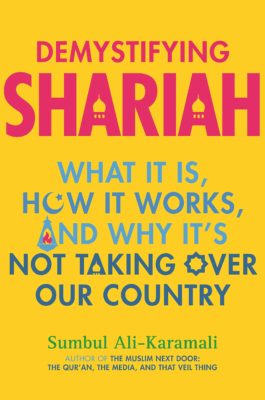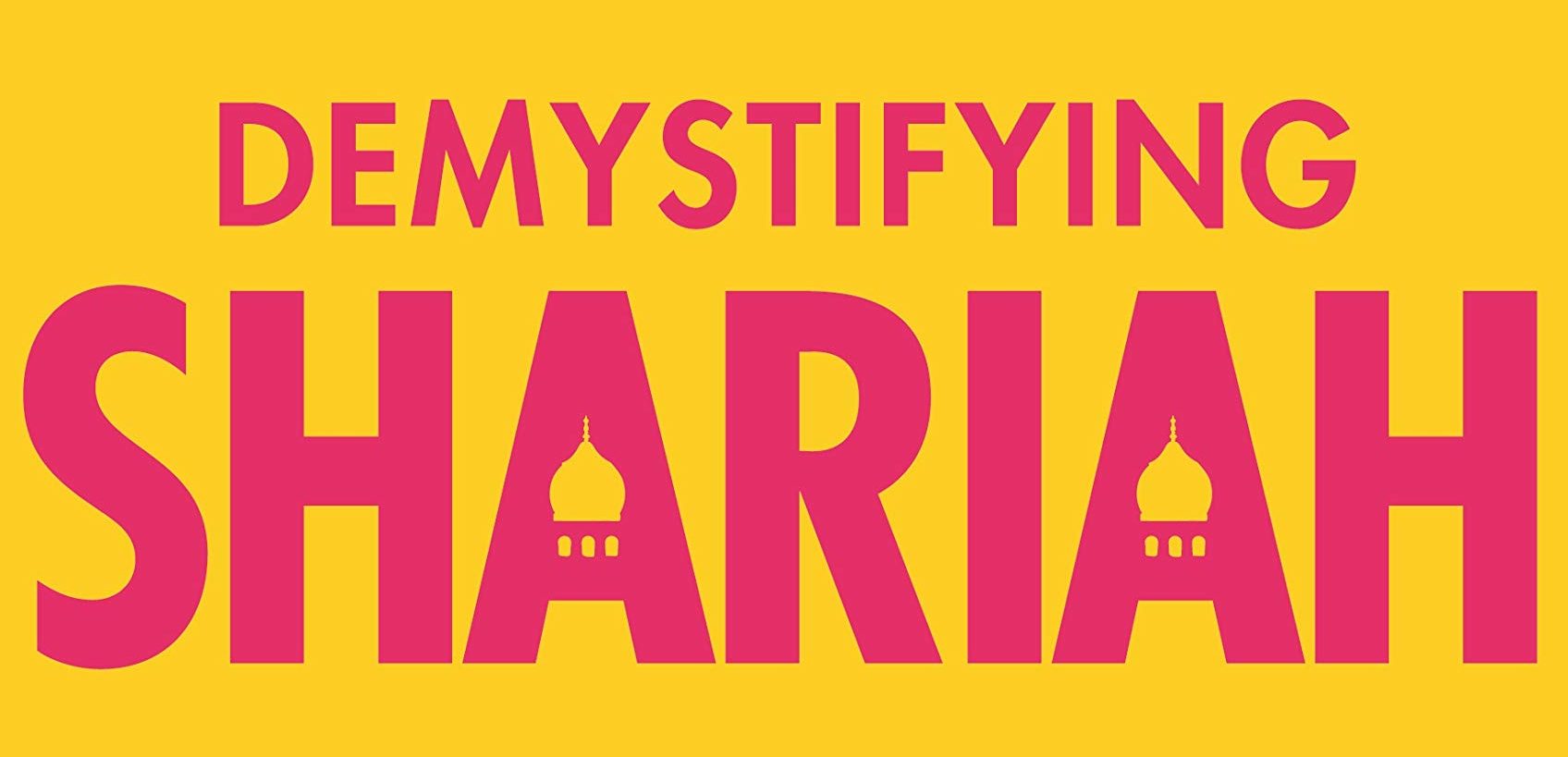When I was originally reading Demystifying Shariah: What It Is, How It Works, and Why It’s Not Taking Over Our Country, it was July and I was visiting family in Texas for the first time in a year and a half.
My gut reaction was that it was a fine book and did what it set out to do quite ably, but it had missed its opportunity to be truly relevant.
Other than personal edification, its main utility would be understanding the way that U.S. reactionaries set their sights on a concept unfamiliar to most Americans so they could define it as foreign and scary, and use this terror of the unknown in an attempt to achieve partisan cohesion and electoral success.
But, while this utility for understanding the right-wing fear-mongering of “the Franklin School”, Postmodern Neo-Marxists, or especially “Critical Race Theory” may still serve, with the abrupt collapse of the U.S.-backed government in Afghanistan and apparent total victory of the Taliban this month, it’s clear that accurately understanding shariah is going to be relevant again.
For that, we’re lucky that Sumbul Ali-Karamali has written such a book for us already so we can be prepared for the anti-Muslim backlash already under way.
Now, her book is written to serve as “baby’s introduction to Islam”, so be aware going in that the early portions are a little slow since Ali-Karamali has to assume that her U.S. audience will include many people who know nothing about Islam, its history, or culture except for the negative stereotypes.

Certainly, I didn’t know going in that even the phrase “sharia law”, as opposed to just “shariah”, is fraught and something of a red flag when you see a person using it.
Ali-Karamali explains that literally, the Arabic word shariah means “the path to the watering place” but within the context of Islam it means the path God wants people to follow to be a good and righteous person.
This is a religious concept that leaves a lot of room for disagreement based on how one interprets the Quran and its seventh-century Arabic text; which sayings and stories about the Prophet Muhammad are reliable enough to trust (hadiths); which tradition of earlier judicial opinions (fiqh) are the best framework; and how one ought to weigh all those things as absolutes for all times versus enduring principles within the context of their own time.
For example, if the Prophet Muhammad guaranteed more equality for women than was common at his time, is the lesson of doing as he did that we should ensure exactly those same liberties or to be just as radical in relation to our own societies’ inequality?
More concretely, shariah also seeks to answer what is the most righteous way to handle disagreements within family law or inheritance disputes?
Hence, “Islamic law” is one of the synonyms of shariah but “sharia law” is just a way to make something sound strange and foreign — some other kind of legal power you don’t understand and don’t want to be subjected to.
In the United States, particularly following the horrors of the Holocaust, there has been a desire to steer clear of overt antisemitism, so you often see the concept of “Judeo-Christian” evoked by conservatives to justify this or that reactionary, supposedly “traditional” value.
But under closer inspection, you’ll find that it’s just a euphemism for “conservative Western Christianity” with an eye toward sounding slightly more inclusive than the Christian supremacist ideas it’s actually perpetuating.
However, “Judeo-Islamic” has a much stronger case for being a coherent concept.
Reading Ali-Karamali’s description of how shariah worked for hundreds of years prior to European colonialism, people who are more familiar with Rabbinic Jewish disagreements will note how much Islam and Judaism share in common on this front. It contrasts the small “o” orthodox Christianities flowing from Constantine, with their patriarchs, popes, and hierarchies that are about establishing one uniform way and answer. Even Protestant denominations which lacked sprawling hierarchical structures have tended to make up for it with an outlook that is universalizing in jurisdiction and righteousness.
Consulting an imam or rabbi for an opinion on matters of religious law can function more like going to a mechanic or doctor. They are authorities but because they are experts rather than having a special position beyond that.
In fact, when it comes to pretty important matters such as when a person is allowed to eat and drink during Ramadan, there are competing learned opinions for how it ought to apply to situations like the newly larger population of Muslims in the Arctic Circle during years where fasting during daylight hours coincides with the midnight sun.
When culturally Christian people hear about “Islamic law”, or that such-and-such poll says that a vast majority of Muslims in a country want their laws to accord with shariah, the opinion of those polled may not align with other ways of thinking about the intersection of religious society and civil society.
Or it may. Getting back to the Taliban, when they promise to allow women to be active in society but “within the frameworks of Islam”, clearly we know that caveat is so big as to make what precedes it irrelevant.
What Ali-Karamali’s book is good at is explaining how this is not a function of Islam itself, or even an older version of Islam that takes itself more seriously than supposed “liberals” or “moderates”, but rather a version of Islam reacting to and shaped by modernism, particularly the legacy and trauma of colonialism, which invaded with more than just armies but also lawbooks.
If you’re still on the fence, there’s a public excerpt of this book that’s a good representation of how Ali-Karamali refocuses anyone who is guilty of Islamophobia — which in the United States is probably most of us — away from ideas born of ignorance and prejudice toward thinking about the absolutely apocalyptic experience that hundreds of millions of Muslims around the world endured with the arrival of Europeans like the English.
When the British applied their law to Muslims in place of shariah, as they did in some colonies, the result was to strip married women of the property that Islamic law had always granted them — hardly progress toward equality of the sexes.
English common law denied wives not only their own property but also their very legal personhood, something that Muslim women had had since the seventh century.
Ali-Karamali goes on to quote Gayatri Spivak in pointing out that, “‘White men saving brown women from brown men’…was and still is one of the great justifications for colonizing or invading Muslim countries.”
We can expect to see a renewed push for the U.S. military to go back to bombing and invading things with the excuse that it’s doing just that, too.

There is a background radiation that permeates European and settler societies, saying “the Orient is exotic, backward, and brutal,” but conservatives will likely be a little louder about all this as they stoke fear about the danger of a metaphorical “invasion” of such people because, they’ll argue, should we allow in refugees from our literal invasion, those alien people will probably try to subject us to their laws and customs — you know, like the United States and European nations actually did.
For reactionaries, nothing is more frightening than the specter of turnabout, which is why you’ll notice their accusations so often include unintended confessions, too.
While I was reading Demystifying Shariah, I thought this book would be good for understanding the way that conservative activists, media, and politicians set about turning ignorance to fear and prejudice, and ultimately utilizing those things to win elections and pass laws intended as much to signal something as actually do anything: opposing Critical Race Theory (CRT); Boycott, Divestment, Sanctions (BDS), “antifa”, “sharia law”; yes, it still does those things.
But with the acknowledgment that the United States spent twenty years of blood and treasure to accomplish nothing much except to kill hundreds of thousands of Afghans, the backlash to this national embarrassment is sure to be harsh.
There may be a new wave of anti-“sharia law” bills in Republican-controlled states, but there’s sure to be anger and violence directed at Muslim communities, and those of us who are not a member of those communities need to purge ourselves of our own ignorance so we can be reliable friends and allies to 3.5 million of our fellow Americans and counting.

